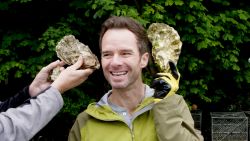









Having undergone a remarkable transformation over the past half-century, Providence has emerged as New England’s creative capital.
Once an industrialized port town, the “Renaissance City” has been completely reimagined, largely thanks to extensive urban revitalization efforts.
Providence is a city where history and innovation intertwine to create a dynamic destination that is celebrated for its outstanding culinary scene, legendary architecture, thriving art community and esteemed educational institutions.
Despite its impressive offerings, the Ocean State’s capital city maintains a fiercely independent, down-to-earth and quirky vibe.
Art is everywhere
more america's best TOWNS to visit 2024
Covering nearly 19 square miles and home to about 190,000 residents, Providence is a city characterized by its 25 distinct neighborhoods, each with its unique charm. The Providence River serves as a natural divider, separating neighborhoods such as College Hill, Fox Point and Wayland on the east side from downtown, Olneyville, West End and Federal Hill on the west side.
Visitors can take to the river with Providence Kayak’s guided trips or cross it on foot at the stunning new Michael S. Van Leesten Memorial Bridge for pedestrians.
It stretches 450 feet across the river and connects downtown to the east side with urban parks at each end, often featuring pollinator gardens, public art, food trucks, pop-up vendors and entertainment.
But the downtown riverfront wasn’t always a dazzling focal point. The Providence River Relocation Project completely changed the face of the city.
This 30-year endeavor, which began in 1988, redirected the Woonasquatucket and Moshassuck rivers. It also revamped transit infrastructure — moving roads and rails — and established a vibrant new riverfront downtown, beautifying the city and generating new commercial land without sacrificing its historic buildings.
On designated nights throughout the spring, summer and fall, more than 80 dazzling bonfires blaze along the river as the city celebrates WaterFire, a transformative public art installation that has been illuminating the city for three decades.
There’s more public art to soak in by walking, biking or driving self-guided tour routes designed by The Avenue Concept, a nonprofit that has collaborated with artists from Rhode Island and around the world to create more than 400 public art installations, including murals and sculptures throughout downtown, the South Side and the West End.

At each stop on the map, you will find a plaque that has the name of the artwork and artist as well as a QR code that provides an interactive experience.
“Public art provides wayfinding, helping people navigate and connect with a city,” says Jenn Harris, deputy director of The Avenue Concept.
Notable works include Andrew Hem’s “Misty Blue” mural inspired by the city’s robust Cambodian community, and Gaia’s “Still Here” mural on the east wall of 32 Custom House Street.
Standing over 80 feet (24 meters) tall, it depicts a contemporary Narragansett woman, Lynsea Montanari. She’s holding a portrait of her tribal elder, Princess Red Wing, a Narragansett/Pokanoket-Wampanoag elder who is surrounded by symbolic imagery of native flora. The mural represents the present and future of the land’s original inhabitants, the Narragansett and Mashpee Wampanoag.
On the west side of Providence, creativity and the arts thrive with an eclectic mix of artist studios and cultural venues. The Steel Yard, Dirt Palace, World’s Fair Gallery, The Wurks, Public Shop & Gallery and DWRI Letterpress (located in the historic Pearl St. Lofts) host an array of festivals, shows and exhibitions.
This summer, in their 15,000-square-foot Main Hall and gallery spaces, the WaterFire Arts Center presents “NetWorks Rhode Island and the Chazan Collection: A Half-Century of RI Artistic Patronage,” an exhibit opening on July 11 that celebrates a dynamic community of artists living and working in Rhode Island and their patron, Dr. Joseph A. Chazan.
Embracing the outdoors
Woven into the urban landscape, the city’s abundant green spaces make it ideal for outdoor enthusiasts.
Roger Williams Park was created in 1871 and covers more than 435 acres.
The park features manicured grounds, recreational ponds, public gardens, tennis courts, ball fields, playgrounds and public art, as well as historic buildings including the Bandstand, Museum of Natural History, Botanical Center, Temple to Music and the Casino, a social center built in the Colonial Revival-style. The Roger Williams Park Zoo is home to more than 100 species from around the world.
The city’s commitment to green spaces extends far beyond Roger Williams Park. Bike paths and walking trails weave through many neighborhoods, offering scenic and practical routes.
India Point Park, an open green space along the water, provides stunning views and is a hub for summer activities, including ferry rides to Newport. It’s also the starting point for the East Bay Bike Path, which covers 14.5 miles (23 kilometers) and passes through state and local parks and charming coastal towns before ending at Independence Park in Bristol.

In Olneyville, behind the historic Atlantic Mills, the Woonasquatucket River Greenway Bike Path connects Providence to Johnston. It features soccer fields, gardens and a pump track along the way.
For architecture buffs, College Hill is home to some of the city’s oldest and most famous architecture. Benefit Street, with its gas lamps and historic homes, and the illustrious campuses of Brown University and the Rhode Island School of Design (RISD) are well worth exploring.
Brown’s David Winton Bell Gallery features works by contemporary artists, while just down the street, RISD Museum presents its extensive collection of design objects and fine art alongside contemporary works. Just a block away, the Providence Athenaeum, a historic library that is open to the public, is housed in a stunning Greek Revival building.
The surrounding streets are filled with historic and notable homes, such as Governor Stephen Hopkins House located at 15 Hopkins Street, The First Baptist Church in America at 75 North Main, and Lippitt House Museum, a Victorian home turned museum, built in 1865.
Diverse dining
You can’t talk about Providence without paying respects to its rich culinary history.
“Our coastlines have world-class fish, and our farmers grow such delicious produce with more accessibility than what you would find in bigger, more saturated cities,” said Nikhil Naiker, currently the chef-in-residence at Courtland Club, when asked about what makes Providence’s culinary scene so dynamic.
ESSENTIAL PROVIDENCE
- EAT: Brunch at Nicks on Broadway or Frank & Laurie’s. Or at Gift Horse or Dolores for date night
- DRINK: Coffee at Bolt Coffee at the RISD Museum and The Nitro Bar. Cocktails at Courtland Club
- STAY: At The Beatrice or The Graduate
- SEE: A Providence College Friars basketball game or a Trinity Repertory Company performance
His current offerings are inspired by the kind of food he grew up eating in Fiji; his parents’ curries and the tea-time snacks they would eat every day, such as pakoras with a spicy tamarind chutney.
You could live here for a decade and not even come close to covering all the incredible dining options, so pace yourself.
High-end dining landmark Al Forno was opened in 1980, and its grilled pizza is legendary. On the flip side from high-end dining, you have Olneyville New York System, a local institution that opened in 1946 and serves hot wieners (not to be confused with hot dogs). They’re known for their proprietary recipe of beef, pork and veal hot wieners seasoned with celery salt.
You can travel the world through the dining scene and learn about the city’s diverse communities. The Italian food in Federal Hill and the plentiful Portuguese bakeries around town (Silver Star in Fox Point is a favorite) are classics representing the waves of immigrants that arrived in the city before World War I.
The Federal Hill Heritage Center offers a fascinating history of the Italian experience in Rhode Island. The seedier history of Federal Hill is well-known thanks to the infamous Patriarca crime family, also known as the Providence Mafia.
Providence is also home to delicious Indian, Bolivian, Oaxacan, Peruvian, Cape Verdean, Haitian, Uyghur, Cantonese, Syrian and Mexican cuisine.
Rhode Island Red Food Tours offer a great way to enjoy the city’s diverse dining options. They’ll take you off the beaten path to five or six eateries, where you’ll sample creative local dishes, learn about the chefs’ backgrounds and philosophies and uncover the rich history and culture of the city’s food scene.
Providence, RI: No. 2 on America's Best Towns to Visit list
In the coming months, the Providence dining scene is gaining a few new stars.
Cielito Mexican Kitchen – helmed by James Beard semifinalist Diego Alcantar, the owner of neighboring Central Falls’ popular Tuxpan Taqueria – is opening any day now. The lunch and dinner menu will feature dishes such as corundas (a type of tamale), carnitas, enchiladas and mole de olla (a rich stew), alongside a colorful cocktail program.
Also set to open soon, Track 15 will be a new food hall located within the historic Union Station. Merchants include many local favorites such as a seafood and raw bar from Dune Brothers; regional Mexican cuisine from Chef Maria Meza and her family at Dolores; burgers from There There; and two Italian concepts from Kevin O’Donnell, chef and owner of Giusto and Mother Pizzeria in Newport.
“Within the city’s restaurant industry, there’s a collective mentality of ‘we’re in this together,’” says Kat Cummings, a multi-hyphenate creative who collaborates with many local restaurants to curate their wine selections through her work with Wine Wizards.
“Rather than intense competition, there’s a sense of community and support, fostering new ideas and collaborations.”
Next town: Tacoma, Washington is No. 3
Find out why “Grit City” shines.
Christine Chitnis is a photographer, journalist and author of the newly released “East Coasting: The Ultimate Roadtripper’s Guide to New England.”










